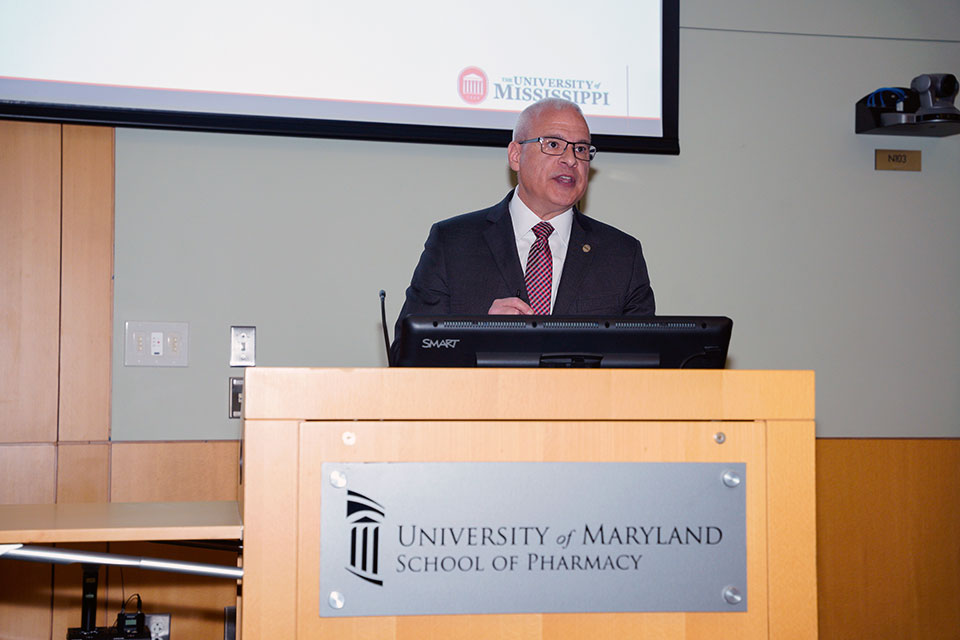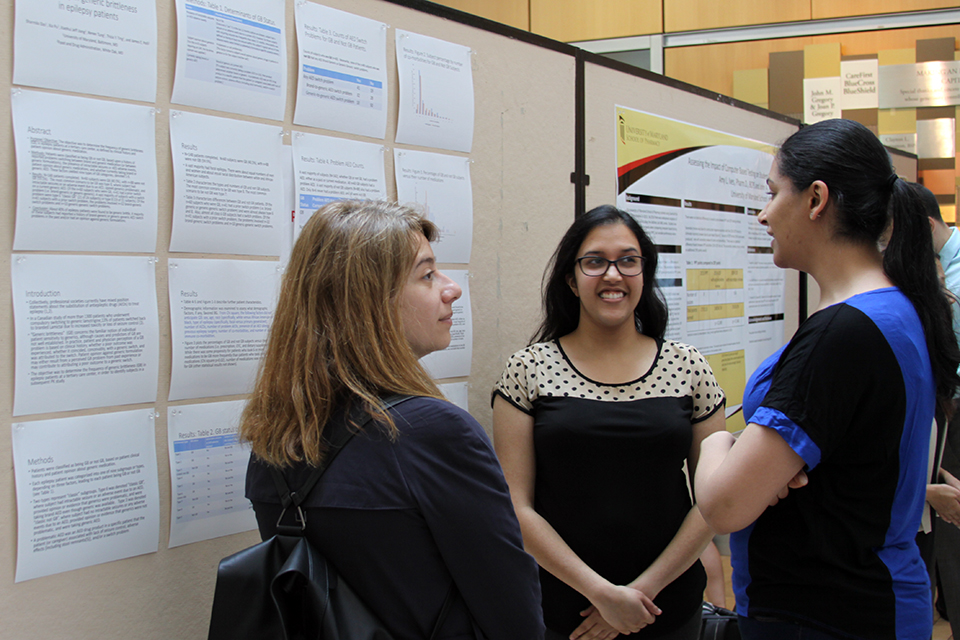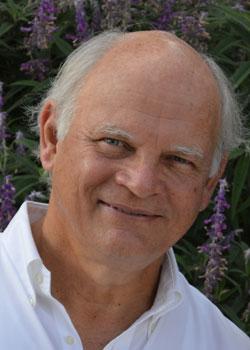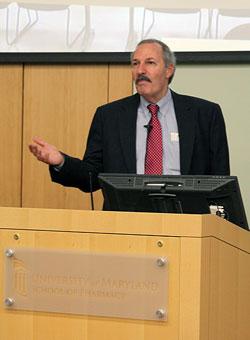Double Alumnus Returns to UMSOP to Highlight the Imperative of Strategic Change in Higher Education During DuMez Memorial Lecture
Noel Wilkin posits that organizational transformation in higher education requires clear vision, emotional intelligence, strong leadership, and a shared commitment to progress.

By Pam Carder
May 12, 2025
In a compelling address to academic leaders and educators, Noel Wilkin, BSP ’89, PhD ’97, FAPhA, provost and executive vice chancellor for academic affairs at the University of Mississippi, delivered a lecture at the University of Maryland School of Pharmacy on “Change Management in the Changing Landscape of Higher Education,” emphasizing that embracing change is not optional but essential in today’s dynamic educational environment.
“It is an honor to welcome Dr. Wilkin to this year’s DuMez Memorial Lecture,” said Christine Rojas, a third-year PharmD student and president of the School’s chapter of the Rho Chi National Honor Society, during opening remarks. “As a proud Rho Chi member and a leader in both academia and pharmacy, he brings a rare blend of personal connection and professional insight. His deep understanding of educational policy and his commitment to innovation made him the ideal speaker for this moment in pharmacy education.”
A School of Pharmacy alumnus, seasoned pharmacist, scholar, and administrator, Wilkin drew on his decades of experience in both academia and health care to outline the principles of effective organizational transformation. As a professor of pharmacy administration and research professor at the University of Mississippi School of Pharmacy, Wilkin spoke from both practical and scholarly perspectives.
“Change is not an occasional disruptor, but the very essence of the management job,” Wilkin stated, quoting leadership expert Robert Schaffer. Wilkin framed the need for change as both reactive and proactive — whether in response to declining enrollment, board passage rates, or broader institutional shifts.
Throughout his talk, Wilkin broke down the process of leading through change into tangible steps, urging institutions to first identify why change is needed, define what must change, and then develop a clear, compelling vision that resonates across the organization. “People follow clarity,” he said. “A strong vision should be a mental picture of what could be — fueled by the conviction that it should be.”
To operationalize this, Wilkin presented several leading change management models, including Prosci’s ADKAR model, Lewin’s Three-Stage Model, Kotter’s Eight-Step Process, and design thinking. Each model, he explained, guides organizations through the same fundamental arc — from a current state, through a transition, to a desired future state.
For the University of Mississippi, Wilkin said Kotter’s Eight-Step Model has become the go-to framework for driving transformation. Whether navigating COVID-19 pandemic response strategies, revising academic curricula, or launching online programs, Wilkin credited the model’s emphasis on urgency, coalition building, and short-term wins with enabling meaningful institutional progress.
One key theme Wilkin returned to is the central role of people in any change initiative. “The university is not its buildings — it’s the people,” he said. He offered that effective change requires not only technical knowledge and procedural adjustments, but also emotional intelligence: self-awareness, relationship management, and a deep understanding of how change affects individuals.
“Micromanagement and underdeveloped emotional intelligence,” he cautioned, “can stifle the talents of those around us.” Wilkin stressed that leaders must understand how their behaviors affect team dynamics and organizational outcomes — particularly when autonomy is high, as it often is in academic settings.
He also introduced frameworks such as SWOT analysis and Bolman & Deal’s Four Frames of Leadership (structural, human resources, political, and symbolic) as tools to identify both the need for change and the best approach for implementation.
Perhaps most critically, Wilkin emphasized the importance of buy-in. In response to a question about what causes change initiatives to stall, he pointed to one common breakdown: failing to connect the change to each individual’s role and benefit. “If people can’t see how a change affects their own life or work,” he said, “they’re less likely to volunteer their support.”
In closing, Wilkin reminded his audience that successful change requires time, patience, and deliberate effort. “We give people autonomy. We must also give them the time and support to change,” he said. “Institutionalizing change is not about commanding it — it’s about building a community that believes in it.”



